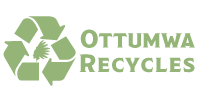If you would like to receive SMS reminders on collection days from Ottumwa Recycles, fill in the form.
Get notified via SMS for City Collection Days!
Kilowatts of Electrity
Cubic Yards of Landfill Space
Pounds of Air Pollution
Gallons of Water
Trees
Barrels of Oil






